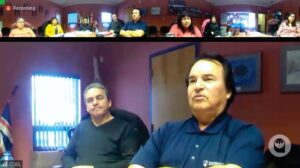Sheshegwaning First Nation pushes historical change in voting protocol

By Kirk Titmuss
SHESHEGWANING FIRST NATION – In a historical shift in governance policy, Anishinabek First Nations’ traditional and customary community decision-making processes will now be recognized by Canada as the method of choice to add their communities to the Anishinabek Nation Governance Agreement Act fold. Schedule C – Protocol for the Addition of a First Nation as a Party to the Anishinabek Nation Governance Agreement – was given Royal Consent on December 1, 2023. The move comes after Anishinabek Nation officials pushed for an amendment to Section 14.6 of the Agreement, a federal policy that caused many Anishinabek Nation First Nations to fail to ratify the deal by the October 1, 2022, deadline.
The original Agreement required communities to adhere to a voting threshold that restricted their ability to gather enough support and pass the vote. Communities wanting to conduct a vote had to have 25% plus one of their eligible voters vote and the majority of those that did vote, vote YES.
For most Anishinabek First Nations, about 75% of their citizens live off-reserve, making it difficult or nearly impossible to meet Canada’s threshold requirement.
Communities that came close to ratifying the Agreement were able to hold a second, simple majority vote; however, for some, carrying out another vote created mistrust in the process. Social media was rife with conspiracy theories and calls for communities to avoid the Anishinabek Nation change in voting protocol Governance Agreement altogether. That, combined with the obstacles caused by the COVID-19 pandemic, saw many second votes failing as well.
In 2020, Sheshegwaning First Nation refused to follow the Agreement’s voting protocols and stuck to their customary way of reaching consensus for the Agreement. Canada, however, would not recognize their process and put Sheshegwaning’s bid for inclusion in B’Maakonigan – the central governing body – in limbo.
During a governance meeting with Sheshegwaning First Nation on Dec. 12, 2023, Agreement lead negotiator, Martin Bayer, commended the community for standing its ground and helping initiate the amendment to the Agreement.
“What this Schedule C, this protocol does, is really put in place what you decided and the position you took back in 2020 where you said the result is in satisfaction and in accordance with our normal procedures and First Nation approval.”
Bayer also remarked how quickly Canada pushed the amendment through, taking only a year to draft and pass the new protocol legislation that officially recognizes a First Nation’s right to make decisions – like voting on the Governance Agreement – through its self-determined community approval process.
Sheshegwaning First Nation Chief Alana Endanawas said she was overjoyed that her community played such a role in the “crucial revisions” to Schedule C of the Agreement.
“We are grateful for the opportunity to have our voices heard and to contribute to the ongoing progress towards decolonization and self-determination.”
Others attending the meeting included Anishinabek Nation Commissioner on Governance Patrick Madahbee who also praised Sheshegwaning’s contribution to the development of Schedule C.
“You guys are the ones that started this. This is a national precedent.”
Anishinabek Nation Grand Council Chief Reg Niganobe echoed Commissioner Madahbee’s remarks commending Sheshegwaning for leading the Agreement’s ratification process changes.
“With the new amendment and ratification process with the Anishinabek Nation Governance Agreement, we’re finally using our own processes to approve agreements within our communities. That process may differentiate from nation to nation but in the end, this is a community (Sheshegwaning) that has guided us and decided on the process they will use. This is cause for celebration as we have once again moved away from Canada’s colonial agenda for our nations.”
Grand Council Chief Niganobe says at least three more communities are looking at becoming part of B’Maakonigan due to the amendment.
B’Maakonigan CEO Leslie McGregor is also pleased with Canada’s Schedule C amendment. She feels it represents a brighter future for the Anishinabek Nation and another step away from the Indian Act.
“Now referred to as the First Nation Approval Process, this progressive process acknowledges and upholds the importance of community decision-making rooted in Anishinabek traditions and customs. This new process marks another milestone in the ongoing journey towards self-determination.”

